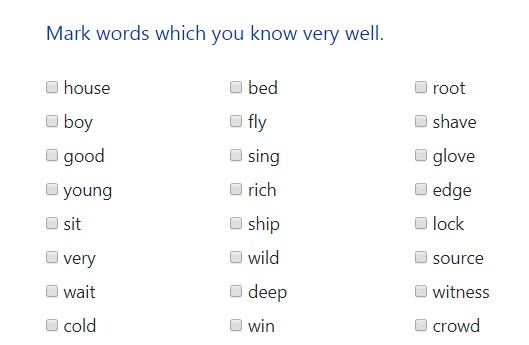Lesson 10
What You Need Before You Start
On Friday, we have an interesting conversation in our class. Our teacher has a question for us. She asks, “What was your first reason to learn English? Do you remember the moment when you started to learn English? When did you start to be really interested in the language?”
I say that I remember the moment when I started to be interested in English. My teacher says, “Can you tell us what happened?”
I say, “Yes. First I have to say that English wasn’t always my favourite subject. I started to learn English at high school. At the beginning, it was very difficult for me. I didn’t understand the structure of the language. It was illogical to me. I tried to remember words. I tried to learn grammar but it was very hard.
When I finished high school, I was still only a beginner. I couldn’t speak English and I believed that I would never learn this language properly. I simply believed that English wasn’t for me.
Then something happened. I always liked music and when I was twenty, I started to listen to the Beatles. I wanted to understand what they were singing, so I started to translate their songs. Slowly I understood more and more.
Then I met two ladies from England on a train. We had a simple conversation but it helped me very much. I started to believe that I could learn English. From that moment on, I was working on my English almost every day and I was getting better and better. Then I decided to go to England and improve English here.”
My teacher thanks me for sharing my story. She also tells me, “Here is something very interesting about your story. You are still you. The first you didn’t have motivation to learn English. The second you had a motivation. You wanted to understand songs. You can see that motivation is very important. When you have it, you can succeed. When you don’t have it, it is very hard to be successful.”
Then our teacher asks everybody in the class about their motivation to learn English. The stories are very interesting. One girl’s motivation is to be able to read historical books in original English. One student wants to be a professional tennis coach in England. He wants to speak perfect English before he starts his career as a coach. One woman wants to work for a big international company and she needs English for her job. I can see that everybody has some kind of motivation to use English in real life or to get information from books.
At the end of the lesson our teacher asks us if we like English.
I say, “I didn’t like English at my high school but now I like it a lot. I can see how useful it is to know this language.”
Our teacher says, “This is another important factor when you learn a new language. It is good when you like something which is connected to English. It can be people, music, culture, or history. If you like English, it is easier for you to learn it.
If you want to be able communicate in English, it is good to know 3000 words or more. If you don’t like English, it is more difficult to find time to practise enough to get to the level of 3000 words.”
I can agree with my teacher. Now, I like not only the Beatles but also my teacher and my boss who is also English. I also like English humour. Now it is much easier for me to find time to practise English every day.
On Saturday, I go to play football for my school team. We have some very good players on our team and we win 3-2. We are all very happy. We go to the pub after the match and we celebrate our victory.
When you want to learn English, you need to have motivation to use English every day.


